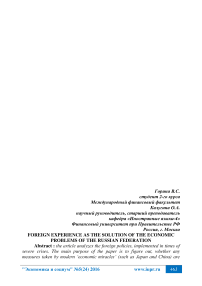Foreign experience as the solution of the economic problems of the Russian Federation
Автор: Горина В.С.
Журнал: Экономика и социум @ekonomika-socium
Статья в выпуске: 5-1 (24), 2016 года.
Бесплатный доступ
The article analyzes the foreign policies, implemented in times of severe crises. The main purpose of the paper is to figure out, whether any measures taken by modern ‘economic miracles’ (such as Japan and China) are applicable for the solution of the economic problems in the Russian Federation. It is concluded that the current situation in Russia has nothing in common with the experience of China and Japan. However, the restructuring processes in the Russian Federation prove to be relatively successful, so there is a hope that someday Russian itself can become an example for the other states facing similar problems.
'economic miracles', financial crisis, deficit of budget, modernization
Короткий адрес: https://sciup.org/140119662
IDR: 140119662
Текст научной статьи Foreign experience as the solution of the economic problems of the Russian Federation
The Russian Federation is currently experiencing the financial crisis. As a matter of fact, it results from the significant imperfections in the structure of Russian economy. In such terms the changes are required. Some economists believe the foreign experience is useful as the potential basis for future economic reorganization. The question is, whether the tools successfully used by some states in the past are applicable for the Russian Federation today. There are different opinions on this point.
To start with, let us define the main examples of policies that really helped some countries to overcome the severe crises some time ago. The most famous example is the case of Japanese ‘economic miracle’, occurring in the post-WWII period. The main features of reforms performed to achieve such ‘miraculous’ results were: policy of cooperation of manufacturers, suppliers, distributors and banks in groups, strong quality management strategy of companies, the policy of guaranteed ‘lifetime employment’, and the focus on technology industry’s development [4]. Secondly, the example of Chinese economy should be mentioned. In the relatively short period, China managed to catch up with the majority of developed countries in terms of GDP volume. Nowadays it is considered to be one of the most promising economies in the world. Such success was achieved mainly due to the Four Modernization policy, aimed at strengthening the field of agriculture, industry, national defense, and science and technology. In addition, China managed to combine the communist ideology in political sphere with market economy [3].
In our opinion, none of the policies mentioned above could be used to solve the current problems of the Russian economy.
First of all, Japanese strategy of big unions of companies, suppliers and banks is too risky because of the size of the Russian Federation. It would be problematic to control such huge organizations, especially taking into consideration the problem of corruption. As an example may serve the current situation in the sphere of education, where the similar policy is currently implemented. Many schools, kindergartens and higher education institutions are being united into huge clusters. As a result, the system became too ‘bulky’, causing additional problems with documentation and the span of control [1].
Another problem is that there are obstacles for the development of technological and scientific fields in Russia because of ‘brain-drain’ - the mass migration of intellectually gifted people to foreign countries. The reason is that it is much more beneficial for ‘brainpower’ to implement their ideas abroad, rather than in Russia as there are no proper conditions available.
Finally, the policy of Chinese modernization is not applicable for Russia because of the population limitations. One of the keys to success of China was the volume of labor force, decreasing the production costs and attracting foreign producers and investors. In the Russian Federation since 1990 until 2012 there was negative population growth. As a result, we have population of only 146 million people (in comparison with 1, 375 billion people in China) [5].
Surely, many other examples of policies in different states are worth mentioning. But the main point is that there has never been any case of successful policy taken under exactly the same conditions as the ones currently experienced by the Russian Federation. The most essential problem of Russia nowadays is the ‘Resource Curse’ - high dependency of the whole economy on the raw materials exports. That is the reason why the current fall in the prices of oil, gas, metals and ores resulted in the deficit in the budget of the state. There are many states facing similar problem, but there is no particular example of successful solution of such a problem. That is why we think the foreign experience to be practically non-applicable to the situation in Russia.
To sum everything up, the crisis of 2014-2016 proves to be less severe than the General Crisis of 2008-2009. According to the forecasts of economists, the deficit of budget as a percentage of GDP will be 3-4% only (in 2009 it was more than 8%)[2]. That means that the current processes of economic restructuring are running in the right direction. Such deep measures surely require a lot of time. Still we believe that someday Russian economy will become another ‘economic miracle’, the example of which may help other ‘resource-curse’ countries to overcome similar problems.
Список литературы Foreign experience as the solution of the economic problems of the Russian Federation
- Alla Mozhdzhenskaya . «Cкованные одной цепью: как происходит объединение вузов». Ponedelnik online magazine. URL: http://ponedelnikmag.com/post/skovannye-odnoy-cepyu-kak-proishodit-obedinenie-vuzov
- Ben Aris. 2016 Prognosis: Another Tough Start for Russia Before Return to Growth. Russia Insider online magazine. URL: http://russia-insider.com/en/business/2016-prognosis-another-tough-start-russia-return-growth/ri12002
- Gregory C. Crow . Economic Reform and Growth in China. Department of Economics, Princeton University, USA. URL: http://aeconf.com/Articles/May2004/aef050107.pdf
- Masahiro Takada . Japan’s Economic Miracle: Underlying Factors and Strategies for the Growth. Professor Wylie. URL: http://www.lehigh.edu/~rfw1/courses/1999/spring/ir163/Papers/pdf/mat5.pdf
- Russian Population. Trading Economics Official Statistical Website. URL: http://www.tradingeconomics.com/russia/population


